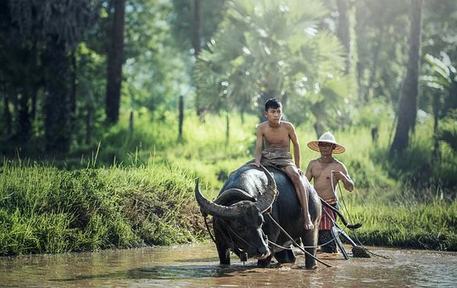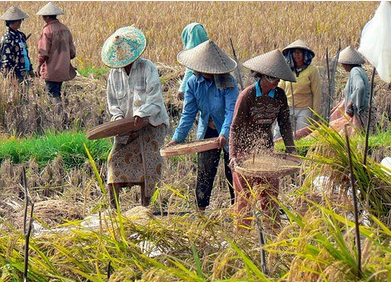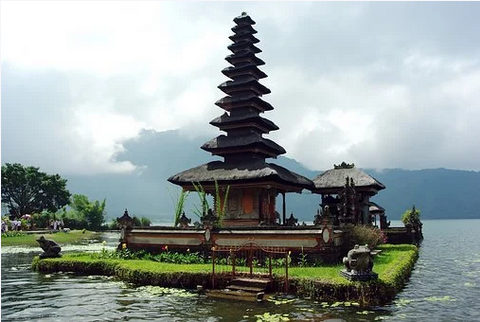Indonesia (Republic of Indonesia) is a country located in Southeast Asia and Oceania. This country is spread over thousands of islands between Malaysia and Australia. Its population is about 270 million, it is the fourth-largest population in the world and the country with the largest Muslim population in the world. The capital of this country is Jakarta. Indonesia is the largest economy in East Asia.
Indonesia shares land borders with Papua New Guinea, East Timor, and Malaysia, while other neighboring countries include Singapore, the Philippines, Australia, and the Andaman and Nicobar Islands region of India. Indonesia is a diverse country in which more than 300 local languages are used. Indonesia has more islands than any other country, more than fourteen thousand. In which no one lives on thousands of islands. Indonesia is also a member of the G20, a grouping of the world's largest economies.
Geographically, Indonesia is vulnerable to earthquakes and volcanic eruptions. In 2004, a massive sea earthquake devastated the entire coast of South and East Asia. About 220,000 Indonesians were killed or missing in this tsunami that hit the Indian Ocean. Indonesia is traditionally considered extremely prosperous and the country is full of festivals.
In the last few years, extremist Islamic organizations have also registered their presence here. Some are accused of having links to al-Qaeda. The terrorist organization that carried out the Bali blasts in 2002 was accused of being involved in these blasts. 202 people lost their lives in these blasts.
 |
| image credit-pixaby.com |
history of Indonesia
The history of Indonesia is also associated with India. of 300 BC. In that period, when Emperor Ashoka was ruling, in the same period, Hindu kingdoms were ruling inside Indonesia as well. Java and Sumatra are the two largest islands here. It was on these that the Hindu empires began. This happened under the influence of Hindustan. The merchants of India used to carry their goods there through the sea. Along with them Hinduism also reached there. After some time there were also Buddhist kingdoms. Indonesia was ruled by Hindu and Buddhist kings for a long time.
The Indonesian archipelago has been an important trading area since the seventh century when there were trade links with China and India during the Srivijaya monarchy. The local rulers gradually adopted the Indian cultural, religious and political pattern, and Hindu and Buddhist kingdoms flourished over time. Indonesia's history has been influenced by foreigners who have been drawn in by the region's natural resources. Muslim traders from India brought Islam with them in the 11th century, and European powers fought each other over a monopoly in the spice trade here. After the arrival of Islam, Muslim kingdoms also started coming. When Indonesia was conquered by the Portuguese in 1511, it was ruled by a Muslim Sultan. After three and a half hundred years of Dutch colonialism, independence was achieved after World War II.
Indonesia was a colony of the Netherlands and Indonesia gained independence on 17 August 1945. Sukarno became the first President after independence. Indonesia achieved independence under his leadership. But then rebellions started. I thought the system would turn upside down. Then Sukarno started a kind of military rule. Became a dictator. The same system continued there. Democracy finally came here in the year 2004. Presidential elections were held for the first time, and the people chose their ruler.
The National Monument or 'Monas' symbolizes the determination of the people here to achieve freedom. The 137-meter tall marble memorial pillar has a flame on top of which is coated with 35 kg of gold.
Indonesia has also had links with ancient India. Even today, a glimpse of Indianness is visible in the festivals here. There are also ancient Hindu temples that testify to this. A large number of Indians reside in this country. The main language spoken here is Indonesia. Other languages also include language Java, language Bali, language Sunda, language Madura, etc. The name of the ancient language was Kavi which contains the major literary texts of the country.
Today the world's largest Muslim population lives here. Despite its Islamic population, it is secular. It gives freedom to its people to follow any religion. It is more democratic than all the Islamic countries of the world.
Indonesia's religious tolerance is an example. There is no distance between Muslims and Hindus here. There are a large number of temples related to Hinduism and Buddhism in Java.. Vayudi Sahastradinama, a puppet maker in Yogyakarta, calls Java the 'City of Tolerance'. Like other people, he also fasts and makes puppets. He says religion and culture are different things for me.
Economy of Indonesia -
Indonesia is a mixed economy, with both the private sector and the government sector playing a role. Indonesia is the largest economy in Southeast Asia and one of the G-20 economies. In 2010, Indonesia's estimated GDP (nominal) was approximately 706.73. was billion dollars. The industry sector contributes the most at 46.4% to GDP, followed by the service sector at 37.1% and agriculture at 16.5%. Since 2010, more jobs have been provided in the service sector than in other sectors. However, the agricultural sector was the major employer for centuries. In 2010, Indonesia was the 27th largest exporter according to the World Trade Organization. Oil and gas, electrical equipment, play-wood, rubber and textiles are the main exports. Machinery and equipment, chemicals, fuels and foodstuffs are Indonesia's main imports.
 |
| IMAGE CREDIT-PIXABY.COM |
History of Bali of Indonesia
Known as the 'Island of the Gods' in Indonesia, Bali is home to 4.2 million people. There are 11 big mountains, out of which two are active volcanoes. These volcanoes have erupted lava many times. Bali's most famous volcano Batur has a special attraction for tourists. The deep connection of this region with Hindu culture and civilization can be felt. There are different beliefs of Hinduism here. A different form of devotion to the trinity of Brahma, Vishnu and Shiva can be seen here. On a square kilometer basis, Bali has the largest number of temples in the world. For this reason it is also called the island of thousand temples.



